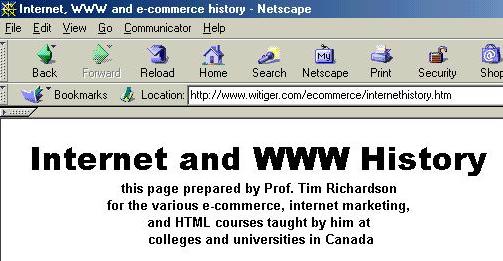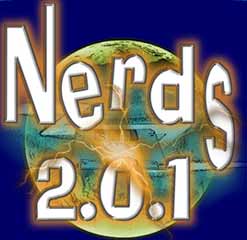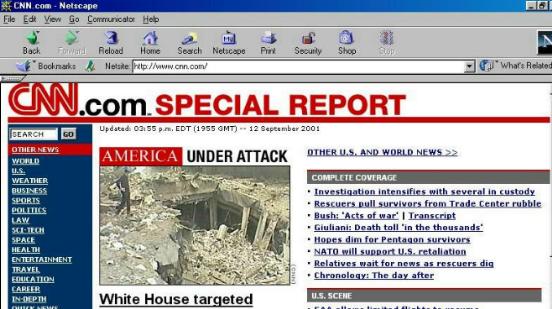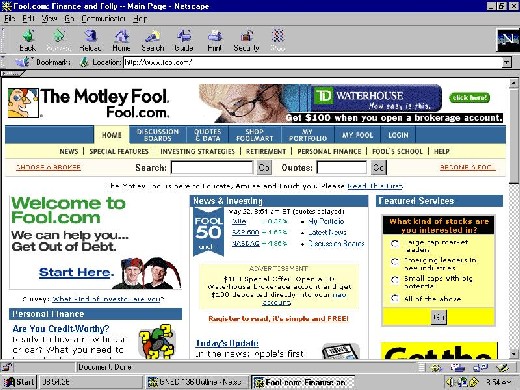
As Taught by Prof. Tim Richardson
Outline136 A ©
 |
As Taught by Prof. Tim Richardson Outline136 A © |
.
|
|
|
|
|
| First
Class |
explanation of assignments
www.witiger.com/centennialcollege/GNED136/assig136.htm explanation of grading
structure
hand out of detailed course information, including copies of the web pages for the first few classes |
| . | There
is a purpose in giving you information and links to learn about the origins
of the Internet and WWW.
At the time of this course (Jan-April 2003) many significant changes continue to take place in the further development of the internet. So,
the purpose in giving you information and links to learn about the origins
of the Internet and WWW is to equip you with an understanding which will
help you personally judge the immediate future events and activities so
that you may be better able, as a student and later as a business person,
to evaluate particular situations and judge whether to use, or not use,
learn or not learn, spend money or save money, as these develop.
|

 |
In the video
we show in the second class, we discuss
Steve Case - founder of AOL
- America Online
A list of all the people mentioned in the video is at www.pbs.org/opb/nerds2.0.1/cast/ |
| In the week
of Sept 11-14th, 2001 some significant events took place. These events
were very tragic and the magnitude of the disaster will perhaps define
a generation.
It also allowed us a perfect example to look at the "Impact of the Internet on Society" |

|
| In the second class the video talked about Motley Fool, we discussed what the company did and why young investors might find its web site attractive. |  |
What is HTML and how do you
make web pages
- Professor Richardson will
explain, in class, the basics steps involved in making a web page and what
HTML is
- this is not a web page
design course, the purpose of this section is to meet the requests of previous
GNED 136 students who wanted some time in class regarding the fundamentals
of making a web page
http://www.boutell.com/faq/oldfaq/url.htm URL stands for "Uniform Resource Locator". It is a draft standard for specifying an object on the Internet, such as a file or newsgroup. URLs look like this: (file: and ftp: URLs are synonymous.)
file://wuarchive.wustl.edu/mirrors/msdos/graphics/gifkit.zip
The first part of the
URL, before the colon, specifies the access method. The part of the URL
after the colon is interpreted specific to the access method. In general,
two slashes after the colon indicate a machine name
Can I catch a virus by looking at a web page? http://www.boutell.com/faq/oldfaq/virus.htm Probably not, if you keep your software up to date. Your computer can, of course, catch a virus if you download an executable program from an untrustworthy site and then, of your own free will, double-click on it in your file manager (or Mac desktop, or...). This is the same risk you run when downloading programs from bulletin board systems or via anonymous FTP. |
| www.witiger.com/centennialcollege/GNED136/worksheetnavigating.htm |
| Debate
|
Class
Debate
- the class will be divided into two parts to discuss "The Internet is Good", or "The Internet is Bad" - read the preview www.witiger.com/centennialcollege/GNED136/debate.htm |
.
.
.
|
|
CONTACTIMAIN PAGE I NEWS GALLERY IE-BIZ SHORTCUTS I INT'L BIZ SHORTCUTS IMKTG&BUSINESS I TEACHING SCHEDULE IMISTAKES ITEXTS USED IIMAGESIRANKI |
| . |